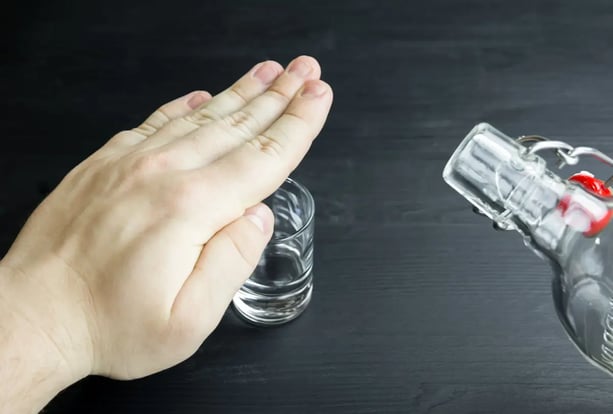When we are discussing addiction, we often come across the term alcoholism addiction. And it's important. It is a common issue in the recovery journey from alcohol addiction and can hinder progress towards sobriety.
It's important to deal with denial if you want to heal from alcoholism. People must first realize and accept that they have a drinking problem in order to get over this obstacle. Denial keeps them from getting help and taking the steps they need to take to get better. By knowing how alcoholism denial works, people who are dealing with addiction and those who care about them can work together to help each other get on track and stay better.
Let's help you understand what constitutes alcoholism denial and why it poses challenges during recovery. We'll explore how denial manifests itself through specific behaviors and thought patterns.
Researchers estimate that up to 50% of people who would benefit from personalized care remain unaware that resources are available. Don't worry; we'll also provide practical strategies for overcoming such denials—supportive steps you can take as someone wrestling with your own struggles or trying to assist a loved one seeking redemption.
What is Alcoholism Denial?
Alcoholism denial refers to the psychological defense mechanism that allows individuals struggling with alcohol addiction to refuse, minimize, or rationalize their drinking habits. It's like putting on a pair of rose-colored glasses and refusing to see the negative consequences that arise from excessive alcohol consumption.
Many people in denial about their drinking may believe they don't have a problem. That's because they think that they haven't hit "rock bottom" or experienced severe repercussions yet. They might downplay the frequency and amount of alcohol they consume or make excuses for their behavior when confronted by loved ones.
Recognizing denial as the first step in addressing alcoholism is crucial. Only by acknowledging there's an issue can someone begin taking steps toward recovery. It can be seeking professional help, joining support groups like Al-Anon or Alcoholics Anonymous (AA), talking openly about concerns, or attending educational programs for those grappling with substance abuse disorders.
We need to learn what alcoholic denial is and why it happens to people with drug problems. We need to be able to approach with empathy to the loved ones who are reluctant to change, helping them face the truth and become more open to change.

Signs of Denial in Alcoholism
When it comes to alcoholism denial, there are several telltale signs that can help you recognize if someone is struggling with addiction but refusing to acknowledge it. These signs often involve various defense mechanisms and rationalizations. Let's take a closer look at some common behaviors associated with denial.
- Blame
Blame involves shifting responsibility for their drinking onto external factors. An alcoholic may blame others or situational circumstances rather than take ownership of their behavior. For instance, they might say things like, "If my spouse didn't nag me all the time, I wouldn't need to drink," or "It's just because of the stress at work that I have to drink."
Individuals blame outside influences instead of recognizing personal accountability for their actions and choices. In such a manner, they can avoid confronting the reality that they have a drinking problem.
- Concealing
Concealing is another sign of alcoholism denial, where individuals try to hide their drinking from others. They may go to great lengths to cover up their habits and avoid discussing the issue when confronted. For example, they might use breath mints or mouthwash as an excuse for the smell of alcohol on their breaths.
Denial can also involve downplaying the extent of their drinking by making statements like "I only had a couple" or "I can stop anytime I want." These attempts at concealing are aimed at maintaining a façade of control and normalcy while avoiding judgment.
- Defensiveness
When your loved one is in denial about their alcohol consumption, they may become defensive and protective of their behavior. They feel the need to justify and protect their actions as a personal choice or right.
For example, someone might express that they can handle alcohol just fine or that they only drink socially; it's not a problem. This deflection helps them maintain control over how others perceive their drinking while avoiding facing the reality that they may have an unhealthy relationship with alcohol.
- Dismissing
Often, when confronted about their drinking habits, individuals in denial may brush off the concerns or downplay them as insignificant. They might say things like, "Let's not make a big deal out of it," or "I just enjoy a few drinks; it's not like I have an addiction."
By dismissing the issue, they avoid acknowledging that their drinking has become problematic and refuse to engage in meaningful conversations about seeking help or making changes. This behavior can be frustrating for loved ones who are genuinely concerned and trying to offer support.
- False Agreement
False agreements give the appearance that they are willing to address the issue and seek help. But deep down inside, there's resistance preventing them from taking meaningful action toward recovery.
For example, someone struggling with denial will tell you, "Yeah, I need to cut back" or "This is my last drink," yet continue drinking excessively without making any real changes in their behavior.
- Making Comparisons
Individuals in denial may justify their drinking by comparing themselves to others who they believe are worse off or have more severe drinking habits. They use this comparison as a way to downplay their own behavior and convince themselves that they don't have a problem.
Someone might say, "Yeah, I drink every weekend, but at least I'm not like John, who drinks alone every night." By pointing out the extreme behavior of others, individuals in denial try to diminish the seriousness of their own alcohol misuse.
- Rationalization
Rationalization involves coming up with justifications or explanations to make their drinking seem reasonable or acceptable. They might say things like, "I only drink to relieve stress" or "Everyone drinks; it's a normal way to unwind."
By rationalizing their behavior, individuals in denial avoid facing the truth about the negative effects of their alcohol consumption and maintain a sense of control over their drinking habits. This psychological defense mechanism can be challenging to break through but is essential for recovery from addiction.

Why Do People Deny That They Have a Drinking Problem?
Understanding the reasons behind alcoholism denial can shed light on why individuals refuse to acknowledge their drinking problem. Shame, societal views, lack of education, neurological factors, and the influence of friends and family all play significant roles in perpetuating denial.
- Shame
Shame, a powerful emotion, can contribute to alcoholism denial. Individuals may feel embarrassed or stigmatized about their drinking habits, especially if they come from families where alcoholism was present. For instance, someone who grew up with a parent dealing with alcohol use disorder might internalize shame when facing their own addiction struggles.
It's crucial to understand that having a parent with an alcohol use disorder doesn't make it the individual's fault. Research shows that there is indeed a genetic predisposition involved in developing alcohol addiction, which means factors beyond personal control come into play.
- Lack of Education and Societal Views
A lack of education and societal views can contribute to alcoholism denial. Sometimes, people who misuse alcohol may not have accurate information about the effects and risks associated with heavy drinking.
In our society, drinking is often normalized and socially accepted. Unlike substances like heroin or methamphetamines that are widely stigmatized, it's easier for individuals with an alcohol use disorder to rationalize their behavior due to its social acceptability.
People might convince themselves or others that their drinking falls within the "normal" range. It's because they don't have up-to-date information on what constitutes excessive alcohol consumption. This lack of knowledge further perpetuates denial.
- Neurological Deficits
Recent studies suggest that the same areas of the brain affected by addiction may be responsible for self-awareness. This means that individuals with alcohol use disorder might struggle to fully comprehend and confront the seriousness of their addiction.
Imagine you have an orange-tinted pair of glasses on- everything will look orange, right? Similarly, due to these neurological factors, people with alcoholism may not perceive or understand how deeply their drinking problem affects them and those around them.
- Family and friends' Roles
Out of love and concern, family and friends may often unintentionally enable or make excuses for their loved one's drinking behavior.
For instance, calling in sick on behalf of an intoxicated spouse or continuing to invite someone with alcohol use disorder out to bars can reinforce their denial by minimizing the consequences.
Remember, enabling behaviors often stem from a place of care but can hinder progress toward recovery. It's essential for loved ones to learn healthier ways to support themselves without perpetuating denial.
How to Help an Alcoholic in Denial
Imagine some of your close ones have been struggling with excessive drinking lately. But they vehemently deny having any issues. Approaching them about their alcohol addiction might seem challenging. But it's crucial to help your loved one and offer support without judgment. Let's find out the best approaches-
1. Approach Them With Care and Kindness
Avoid exhibiting anger or frustration, as this may cause them to shut down. Let your loved one know that you genuinely love and care for their well-being so that they feel more comfortable opening up about their struggles.
For example, instead of saying, "You need to stop drinking! You're ruining your life!" try saying, "I've noticed changes in your behavior lately, and I'm concerned about you. Is everything okay? I'm here for you."
2. Inquire About the Individual’s Problems With Alcoholism
When discussing their issues, gently ask them about any challenges they may be facing that could possibly be related to their drinking habits. By opening up a dialogue in a non-confrontational manner, you allow them to reflect on how alcohol might be impacting their life.
For example: "I've noticed you've been missing work recently, and your relationships seem strained. Is there something going on that could be connected to your drinking habits? It's important for both of us to understand what's really going on." This approach helps create awareness and encourages honest self-reflection.
According to studies, individuals who are able/willing to identify and acknowledge specific consequences of their substance use are more likely to recognize the need for change (National Institute on Alcohol Abuse and Alcoholism).
3. Make an Effort Not to Argue
Engaging in arguments often leads to defensiveness and further denial. Instead, try empathizing with the underlying concerns they may have. Acknowledge their struggles but gently point out how alcohol is exacerbating their problems.
For instance, if your loved one expresses stress from work, you can say something like, "I understand that work has been overwhelming for you lately. Have you considered that alcohol might be adding to your challenges? Maybe we can find healthier ways to cope together."
4. Demonstrate to Them That There Is Yet Hope
It's essential to convey a message of hope to your loved one struggling with alcoholism denial. Let them know that there are ways they can overcome their addiction and live a fulfilling life once again.
Encourage them to seek help, whether through support groups, counseling, or recovery programs tailored for alcohol use disorder (AUD). Remind them that admitting the need for help is the first step towards recovery.
Get Help at The Retreat
When it comes to overcoming alcoholism denial and taking the necessary steps toward recovery, finding the right support is crucial. That's where The Retreat comes in.
At The Retreat, we believe in grounding our program on spiritual principles like those found in Alcoholics Anonymous (AA). By providing education and guidance within this framework, we empower individuals to confront their denial head-on while offering them tools for sustained sobriety.
Our programs are designed to foster an understanding of alcoholism denial by addressing its root causes through group discussions, individual reflection exercises, and evidence-based resources. This holistic approach allows participants to gain insight into their drinking patterns without judgment or shame.
Remember—getting help doesn't mean giving up. Rather, it means reclaiming control over your life from the clutches of addiction. With determination and proper support systems such as those provided at The Retreat, recovery is not only possible but attainable!
The Retreat offers a non-clinical, mutual help approach that provides a safe and supportive environment for individuals struggling with addiction or substance use disorder. Don't let denial stand between you or someone you care about achieving freedom from alcoholism - reach out today!




